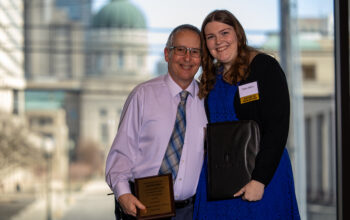By Curtis Honeycutt
I’m a sucker for all things pumpkin during fall. I watch the Charlie Brown special about the Great Pumpkin. I listen to the Smashing Pumpkins. And, of course, I carve jack-o’-lanterns with my kids. I always save the seeds to roast them afterward. If you have a great recipe, send it my way.
Did you know the concept of jack-o’-lanterns comes from the Irish? Any root vegetable can be carved into one, but turnips and pumpkins were the most popular in the field.
Where do we get this name for a carved, lit autumn gourd? You can slice or dice your theories and legends as many ways as you can slice a pumpkin pie, but here are the most common theories.
Back in the 1600s, English people called any general man “Jack,” kind of like how we call men “guys.” Night watchmen were called Jack-o’-lanterns, a shortened version of “Jack of the lantern.”
Somehow by the 1800s, the term jack-o’-lantern was the word for a hollowed-out pumpkin with a candle inside. Theories from Ireland suggest that jack-o’-lanterns were similar to will-o’-the-wisps. These phosphorescent lights came from gases in rotting plants in swampy, marshlike areas.
Whatever their etymological origin, jack-o’-lanterns lost their proper name status and crossed the pond to the U.S., where we still enjoy them.
Halloween once boasted its own interesting apostrophe. Originally known as All Hallows’ Eve or Allhallowmas, Halloween was the day before the Catholic holiday All Saints’ Day. This holiday pretty much covered up the pagan Celtic festival of Samhain, and I’ll let you look that up on your own time. Alholowmesse was the Middle English word for “All Saints’ Day.” From there you can see how we get the “eve” of “Alholowmesse.” All Hallows’ Evening. Hallowe’en. Halloween. Words drift and evolve like this all the time.
I love how many of the terms associated with Halloween come from Ireland, Scotland and England (from whence my people hail). Even the word “eerie” has its roots in these lands.
Not to be confused with “Lake Erie,” derived from the Native American Erie tribe, the word “eerie” was a Middle English word meaning “timid or affected by a superstitious fear.” Eerie’s ancestor is the Old English word “earg,” meaning “cowardly.”
With this etymological knowledge in your bag of tricks, you’re sure to be a thriller at your upcoming Halloween party. Just don’t give out toothbrushes or circus peanuts to trick-or-treaters unless you like cleaning toilet paper out of your trees.
—Curtis Honeycutt is an award-winning syndicated humor columnist and author. Connect with him at curtishoneycutt.com.


